LECTURE: Kenneth T. Jackson : Newark’s Decline and Resurgence in the 20th Century as Lessons for Urban America. Rutgers Bloustein School of Planning and Public Policy. April 25th A REVIEW by Calvin Schwartz
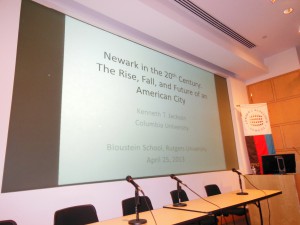
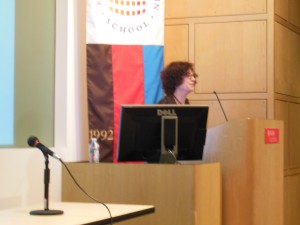 Professor Yael Zerubavel welcoming remarks
Professor Yael Zerubavel welcoming remarksThe moment I saw Newark as the subject of a lecture, I knew the winds of relevance would take me there. I was born and lived in Newark for 20 years and stay relatively active in the alumni association of Weequahic High School where I graduated in the early sixties. I marvel at the good fortune of living 14 traffic lights from a major university, Rutgers, which affords the curious searching mind a never ending source of stimulation and knowledge via its academic offerings to the community.
The lecture was called “Newark’s Decline and Resurgence in the 20th Century as Lessons for Urban America: The Rise, Fall, and Recovery of a Great Metropolis, 1916-2016.” Kenneth T. Jackson, Professor of History at Columbia University spoke and mesmerized. The lecture was sponsored by the Allen and Joan Bildner Center for the Study of Jewish Life and Bloustein School of Planning and Public Policy and was held at Special Events Forum at the Civic Square Building in New Brunswick. And it was completely booked and the overflow was sent to a third floor video feed. Professor Jackson asked for a show of hands who graduated from Weequahic High in Newark; I was one of many who raised hands. And to my surprise and purist joy, the woman sitting directly behind asked at lecture’s end if I really went to Weequahic. I remembered Roz instantly; we were classmates right through the Cuban missile crisis and we hugged at our random chance meeting. My night and month and beyond were made.
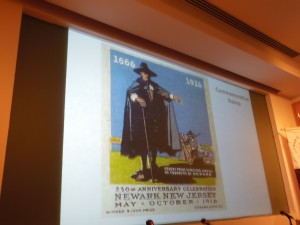 from Newark’s 250th commemorative (1666-1916))
from Newark’s 250th commemorative (1666-1916))
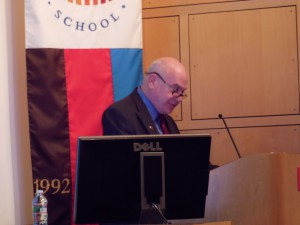 Stuart Meck, Associate Research Professor, and Director,Center for Planning Practice, Edward J Bloustein School of Planning and Public Policy welcoming remarks
Stuart Meck, Associate Research Professor, and Director,Center for Planning Practice, Edward J Bloustein School of Planning and Public Policy welcoming remarks
Professor Jackson journeyed the lecture through world city’s histories. Venice was a major commerce and shipping center; then not. Athens was a major city; then not; same with Vienna, Liverpool and Glasgow and our Detroit. But Newark had everything going for it; at the 250th (1666 to 1916) commemorative it was thought Newark could become a global leading city with major centers of manufacturing, a port that could’ve been the busiest in the world, an airport that was the busiest in the country at one time and even a minor league baseball team in 1937, the Newark Bears, that is considered the best of all time.
Throughout its history, there was a failure of leadership and vision. Newark was small; 21 square miles of which five miles was swamp. Newark was so small compared to Los Angeles with its 400 square miles. And when opportunities existed to annex local towns like Harrison, Kearny or Nutley, Newark’s leaders faltered and never acted. Newark is still small and those other places became cities of their own. But there have been effective leaders too; Charles Cummings, Bob Curvin and Cory Booker.
 Professor Kenneth T. Jackson Professor of History, Columbia University at lecture.
Professor Kenneth T. Jackson Professor of History, Columbia University at lecture.
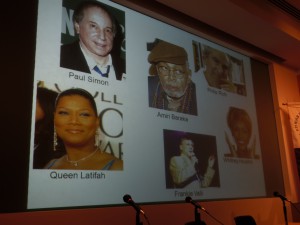 some of Newark’s noted citizens.
some of Newark’s noted citizens.
Newark had the perfect storm of contributing factors of urban decline including the riots back in 1967. There have been notable examples of cities coming back and reinventing like Hoboken did. Professor Jackson was optimistic that Newark could come back despite former Mayor Ken Gibson’s dire statement, that wherever America was going, Newark would get there first. Jackson eloquently discussed his four ingredients to bring back an urban city from decline.
Firstly, reduce crime. Secondly, attract more immigrants. Thirdly, welcome the Gay community and artists. Finally, promote outdoor restaurants. People sitting on the street dining sends a message that people are not afraid to walk around. He cited the explosion of outdoor restaurants on New York City’s Columbus Avenue and its concomitant resurgence.
Everything Professor Jackson talked about fascinated me. I’m a big fan of pinching my arm unobtrusively as a satisfying realization of “look where I am.” A question and answer period followed; the mostly older audience (I felt on the younger side of the scale) peppered comments, praises and questions mostly about their home Weequahic section. A bountiful reception followed. What really impressed me was the availability of the faculty of the Bildner Center and Bloustein School of Planning and Public Policy. I had a chance to talk at length to Professor Yael Zerubavel, Donald S.Sutton, Assistant Dean for External Affairs, Stuart Meck, Associate Research Professor and Director, Center for Planning Practice and Karyn Olsen, Director of Communications. You have to know me; I love engaging academia and the Rutgers faculty was accommodating and hugely generous with their time. The moderately dry Riesling wine satisfied. The lights were dimming in the atrium and doors were locked and I was still chatting with Stuart Meck. Therefore it was a magical night at Rutgers and my exhortation to readers about future programs here; “get off your sedentary sofa.”
http://bildnercenter.rutgers.edu/
Edward J. Bloustein School of Planning and Public Policy: http://policy.rutgers.edu/
Calvin Schwartz: http://vichywater.net Facebook: Cal Schwartz







2 comments
#1joe harvardApril 29, 2013, 6:58 pm
Very well written & informative review of what sounds like a very interesting lecture. So much still to learn about the Garden State, thanks Cal.
#2mel lissnerApril 27, 2013, 3:11 pm
I went through the fine, as compared to other school systems, Newark School System. I taught for 10 years at 14th Avenue School from Pre-K and 6th, 7th and 8th grades, and was there teaching summer school during the ’60’s riots. I was also in Real Estate during those times, in the Newark area, and saw the effect that had on education. My brother just retired from Shabaaz H.S., and my grandson just began his teaching career at a Newark Charter School. If anyone wants feedback from my vantage point I would be willing to share and contribute to a better Newark…..
Add your comment